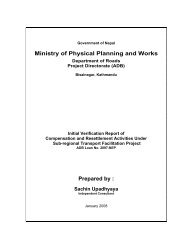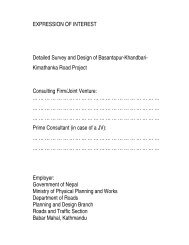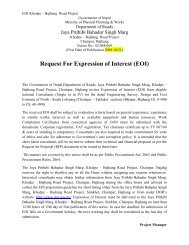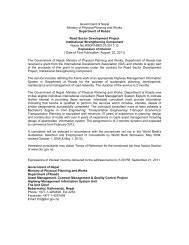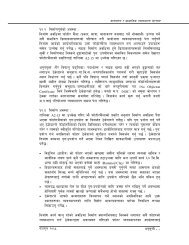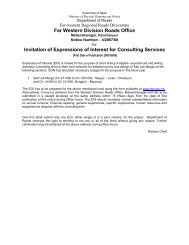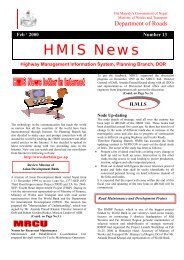Environmental & Social Management Framework - About ...
Environmental & Social Management Framework - About ...
Environmental & Social Management Framework - About ...
You also want an ePaper? Increase the reach of your titles
YUMPU automatically turns print PDFs into web optimized ePapers that Google loves.
<strong>Environmental</strong> and <strong>Social</strong> <strong>Management</strong> <strong>Framework</strong>The SRN program shall therefore make efforts to gradually mainstream thegender equity issue at all stages of project cycle (need assessment, projectplanning/design, implementation, monitoring and evaluation). This strategy willinvolve the assessment of existing roles and responsibility of men, women, boys,girls, elderly, disabled and widows, single mothers etc and increasing theirparticipation and ownership in all stages of project cycle.More specific, the strategy will target primarily disadvantaged women, such assingle woman, widows, or women in polygamy marital relationships within andoutside a household. Women-headed households would be given special priorityin resettlement packages. Appropriate capacity building programs 2 would beintroduced to increase participation and receive valued inputs from womenthemselves.c. Education on Worker’s Rights and Grievance Resolving ProcessesThe work candidates will also receive appropriate information on their rights withrespect to health care, remuneration and payment conditions. A specificgrievance and complain mechanism will be established to ensure the addressingof claims brought forward by the engaged workers.Poor, lower caste women and those from indigenous and tribal communities willreceive preference in selecting wage labourers. Observing (caste-wise) genderquota (suggested is a minimum of 33% in the overall employment of unskilledlabour) will help these women to participate and benefit from the project and toalleviate their status of poverty. Such reservation is proposed to keep at least 33percent for women. A locally contracted NGO will be responsible for monitoringlocal labour employment to ensure that female participation in construction workare maintained and that child labour is avoided.The consultation process shall provide full information and explanation that notonly equal access to employment opportunities are maintained, but that equalwages will be paid for similar work for both men and women. Contractors shallalso be obliged to make payment in frequent and agreed intervals, equally to bothmen and women employed. Payments schedules and amounts need to becontinually monitored by NGOs and CBOs to ensure that both men and womenreceive the payments they are entitled to, and at schedules specified in theircontract.5.6 Public Consultation throughout Project Cycle to Secure SupportConsultation helps identify impacts, sources of vulnerabilities, the householdsand groups likely to be affected and appropriate measures to addressappropriately. Similarly, because the APs know their economic, social, and biophysicalsurroundings best, consultation is useful in formulating environmentalmitigation measures or resettlement options that balance the APs needs andcapabilities with the technical requirements of the options. In carrying out publicconsultation, a number of advantages for smooth project implementation will besecured which are briefly discussed hereunder:The project-affected communities should be continually consulted by the Project<strong>Management</strong> (including supervision and monitoring personnel) to identifyupcoming needs, constraints and priorities and discuss success/mobility needsas well as the levels and kinds of services needed, or what kind of environmentalcorrective measures need to be pursued during the different phases of the road2 Similarly, emphasis is given to include women representatives in the Committees for LandAcquisition and Compensation (CDC), who can rightfully assess and calculate resettlementeffects on women and children.Chapter 5-6 April 2007


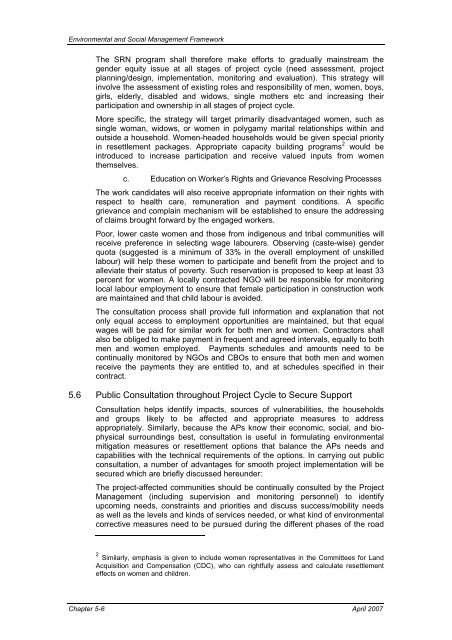
![j:6 ]zg cfof ]hgf](https://img.yumpu.com/51286794/1/190x245/j6-zg-cfof-hgf.jpg?quality=85)
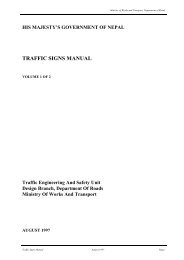
![x'nfsL /fhdfu { cfof ]hgf](https://img.yumpu.com/50581959/1/190x245/xnfsl-fhdfu-cfof-hgf.jpg?quality=85)
